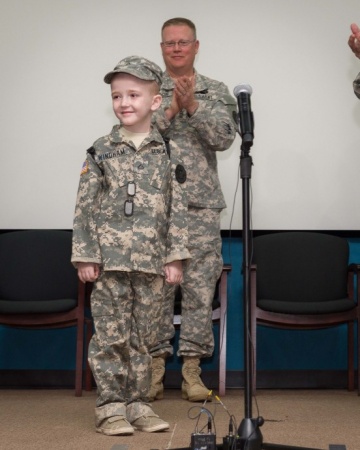Story by: Sgt. 1st Class Malcolm McClendon
Posted: April 2, 2015
 Honorary enlistee Rowan Windham poses for a picture at his honorary enlistment ceremony held at Camp Mabry in Austin, Texas, March 27, 2015. Windham is battling a rare disorder, Shwachman-Diamond Syndrome, which affects the pancreas, gastrointestinal tract, immune system, blood and bone marrow. During one of his stays at the Children's Hospital in San Antonio, Windham met Sgt. David Hixson, a medic with the Texas Army National Guard. There, Windham shared his dream of always wanting to be a Soldier and soon after, Hixson, with the help of fellow Texas National Guardsmen, made it all possible. (U.S. Army National Guard photo by Sgt. 1st Class Malcolm McClendon).
Honorary enlistee Rowan Windham poses for a picture at his honorary enlistment ceremony held at Camp Mabry in Austin, Texas, March 27, 2015. Windham is battling a rare disorder, Shwachman-Diamond Syndrome, which affects the pancreas, gastrointestinal tract, immune system, blood and bone marrow. During one of his stays at the Children's Hospital in San Antonio, Windham met Sgt. David Hixson, a medic with the Texas Army National Guard. There, Windham shared his dream of always wanting to be a Soldier and soon after, Hixson, with the help of fellow Texas National Guardsmen, made it all possible. (U.S. Army National Guard photo by Sgt. 1st Class Malcolm McClendon).
AUSTIN, Texas - With his right hand raised, eight-year-old Rowan Windham took the Oath of Enlistment to become the newest member of the Texas Army National Guard.
Rowan had the unique opportunity to be given an honorary enlistment into the organization during a ceremony held at its headquarters at Camp Mabry in Austin, Texas, March 27, 2015.
After an emotional ceremony for friends and family, the young soldier looked out at the audience, cleared his throat and said, “Thank you. This is the best day of my whole entire life.”
Rowan is currently battling a rare disorder called Shwachman-Diamond Syndrome, which affects the pancreas, gastrointestinal tract, immune system, blood and bone marrow. Rowan has spent more than 900 days in the hospital, received dozens of blood transfusions and made 71 trips to the operating room.
During one of his stays at the Methodist Children’s Hospital of San Antonio, Rowan met nurse’s aide, David Hixson, who is also a combat medic in the Texas Army National Guard. There the two grew close.
“I met Rowan after my last deployment, and we immediately became friends,” Hixson said. “Even though it wasn't under the best circumstances, every time he came back it was like seeing an old buddy.”
At a recent visit, Hixson informed Rowan that he would be deploying soon, and they would not be able to see each other for a while. This is where the eight-year-old expressed his life-long wish to his friend.
“When I told Rowan I was leaving, he told me he too wanted to be in the Army one day, Hixson said. “So after talking to his mom, I contacted a friend at Camp Mabry, who later contacted a lieutenant colonel in the public affairs office, and it kind of just snowballed from there. And here we are today.”
In front of family, friends and distinguished guests, Rowan swore to uphold the U.S. Constitution as many of his fellow guardsmen in attendance did before him. Rowan’s father, Brian Windham, described the event as overwhelming and shared his son’s interest in the military and strong will to survive.
“Rowan actually enlisted himself into the Army on a piece of paper a couple of years ago, so this is fantastic; he’s got to be way overwhelmed with joy,” Windham said. “He’s always looking to help other people. He has two feeding tubes, one goes to his heart the other to his stomach, and everyday he’ll tell you he has the best life ever.”
Rowan’s resilient attitude earned him a spot in his new home unit as he was made an honorary member of the 124th Cavalry Regiment.
“Because we know that you are such a trooper, we want to enlist you into the cavalry,” said Brig. Gen. Sean Ryan, commander of the 71st Troop Command and officiator at the enlistment. “A cavalry soldier always moves forward in battle, and we know that you, Rowan, are always moving forward in your own battles.”
Rowan will continue to combat his illness as he and his family travel to a specialized hospital in Seattle and look at a possible bone marrow transplant. As Ryan states, Rowan is on his way to his own deployment, but not alone, he now has more than 24,000 guardsmen by his side.............MORE PHOTOS